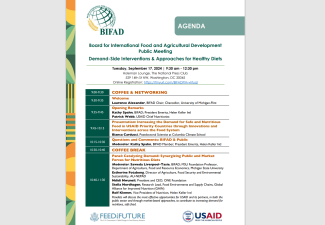Healthy diets that are diverse, safe, and nutritious are central to all development efforts. They are core to the work of USAID and Feed the Future, the U.S. Government’s global hunger and food security initiative. However, food security investments have historically focused on supply-side interventions to increase the production of staple crops, and on livelihoods strengthening to broadly increase consumer purchasing power. Relatively less attention has been paid to promoting safe nutritious foods and generating consumer demand for them. Emerging evidence indicates that a supply-side approach, which largely neglects incorporating a nutrition-sensitive lens, may not be sufficient to achieve healthy diets and overcome malnutrition.
BIFAD, an independent advisory committee to USAID on food and agriculture issues, will convene a public meeting on September 17, Demand-Side Interventions and Approaches for Healthy Diets, to shape the next steps in USAID’s strategic thinking and policy prioritization toward the objective of achieving healthy diets for all. This meeting will address evidence and evidence gaps, areas for additional research, and prioritized approaches and actions for USAID, centered around demand-side interventions and approaches to improve the processing, storage, distribution, sale, purchase, and consumption of safe and nutritious food.
Questions to be addressed at the meeting include:
- How can USAID work better with communities, national governments and private sector stakeholders to enhance consumer demand for safe and nutritious foods in ways that improve the diets of whole households, including women and children?
- How can demand-focused interventions improve the affordability of healthy diets?
- How can the progress and outcomes of demand-focused interventions be measured and evaluated?

